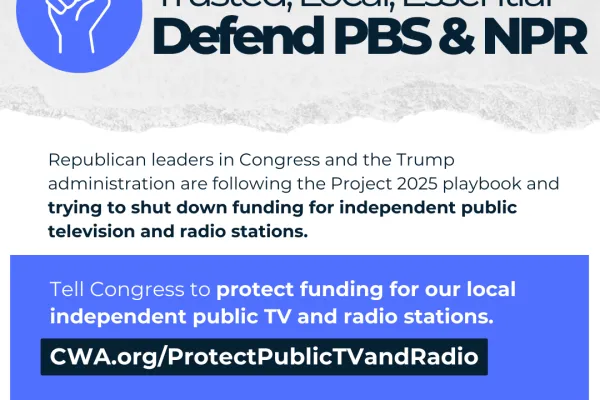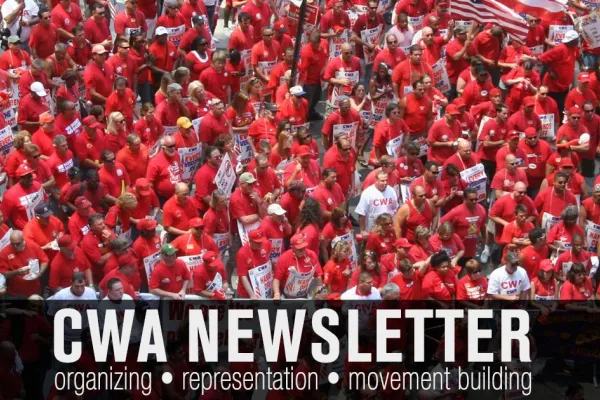NABET-CWA Negotiates Historic $76 Million Back Pay Settlement with CNN

NABET-CWA Negotiates Historic $76 Million Back Pay Settlement with CNN
Union planned to picket Democratic presidential debate due to longstanding labor dispute.
Washington, D.C. (January 10) -- NABET-CWA, a sector of the Communications Workers of America, and its Local 11 (New York) and Local 31 (Washington, D.C.), have negotiated one of the largest back pay settlements in the 84-year history of the National Labor Relations Board (NLRB), requiring CNN America, Inc. to pay a total of $76 million to hundreds of broadcast technicians who were fired when CNN terminated its subcontract with union-represented employees at Team Video Services (TVS). The settlement provides substantial justice to workers who have been waiting more than 15 years to be made whole for the losses that they suffered as a result of CNN’s unlawful conduct.
“After more than 15 years, this settlement agreement finally delivers justice for workers who experienced serious hardship in their lives due to CNN’s union-busting practices,” said NABET-CWA President Charlie Braico. “This incredible settlement in workers’ favor should send a very clear message to CNN and to other employers that union-busting is illegal and has consequences.”
The union’s longstanding labor dispute with CNN threatened to disrupt the upcoming January 14 debate at Drake University, which CNN is hosting. NABET-CWA had advised the Democratic National Committee, Democratic presidential candidates who qualified for the debate, and CNN of its intention to picket the event.
“We are grateful to Democratic National Committee Chair Tom Perez for his help ensuring that this debate will proceed without the disruption of a labor dispute,” said Communications Workers of America President Chris Shelton. “The Democratic presidential candidates demonstrated their commitment to working people by intending to honor the picket line.”
Under the terms of the agreement released today, CNN will pay $76 million to the NLRB, which in turn will make payments to the affected workers. The payments will compensate them for the protracted length of the case and the adverse tax consequences from the size of the payouts. NABET-CWA will withdraw all pending charges against CNN.
AT&T CEO Randall Stephenson and WarnerMedia CEO John Stankey played a constructive role in the settlement talks between NABET-CWA and CNN. CNN is part of AT&T’s WarnerMedia division.
CNN’s ability to avoid taking responsibility for its unlawful behavior for over 15 years shows just how far U.S. labor laws that are supposed to protect workers have become rigged in favor of corporations. While CNN did everything possible to avoid complying with the law, many of the affected workers struggled to make ends meet with minimum wage jobs or were forced to uproot their families in order to find work. Several of the workers have died while waiting for justice from the company.
Background:
More than 300 working families have been seeking justice since 2004, when CNN ended its contracts with a contractor, Team Video Services (TVS), in order to bring the services in-house. Even though NABET-CWA represented the engineers and technicians employed by TVS, CNN refused to recognize NABET-CWA as the workers’ collective bargaining representative, refused to bargain over wages and other terms of employment, refused to retain long-term bargaining unit employees, and unilaterally changed the wages and benefits of the unit employees it retained.
In November 2008, a National Labor Relations Board (NLRB) Administrative Law Judge (ALJ) found that CNN’s misconduct violated federal labor law. Since then, CNN has sought to undermine the ALJ’s decision, filing more than 1,600 exceptions with the National Labor Relations Board (“NLRB”) which were rejected by the NLRB in 2014. CNN then filed a petition for review with the United States Court of Appeals for the D.C. Circuit which upheld the NLRB’s conclusion that CNN discriminated against the union-represented TVS employees.
NABET-CWA and CNN agreed in February 2018 to utilize the NLRB’s Alternative Dispute Resolution (“ADR”) Program to resolve the outstanding issues, including fair compensation for the impacted workers. The ADR process ended on November 15, 2019 without an agreement.

CWA Frontier Lineman Fights for Survival After Shooting


